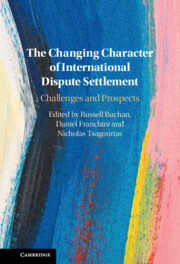Book contents
- The Changing Character of International Dispute Settlement
- The Changing Character of International Dispute Settlement
- Copyright page
- Contents
- Contributors
- Foreword
- Acknowledgements
- Table of Cases
- Table of International Instruments
- Table of Legislation
- Abbreviations
- Introduction
- Part I Recent Trends and Cross-Cutting Issues in International Dispute Settlement
- Part II Effectiveness, Authority, and Legitimacy of the Current System of International Dispute Settlement and Possible Reforms
- 5 Navigating Choppy Waters
- 6 Legitimacy in Settlement of Disputes in International Environmental Law: From Classical to Non-compliance Procedures
- 7 The Role and Legitimacy of International Human Rights Mechanisms of Dispute Settlement
- 8 Settlement of Water-Related Disputes in International Law
- 9 Coherence, Consistency, and the Reform of Investment Treaty Arbitration
- 10 The WTO DSU 2.0
- 11 The Security Council and Impartiality in the Peaceful Settlement of Disputes
- 12 International Criminal Law and the Peaceful Settlement of International Disputes
- Part III New Opportunities and the Future of International Dispute Settlement
- Index
9 - Coherence, Consistency, and the Reform of Investment Treaty Arbitration
from Part II - Effectiveness, Authority, and Legitimacy of the Current System of International Dispute Settlement and Possible Reforms
Published online by Cambridge University Press: 14 December 2023
- The Changing Character of International Dispute Settlement
- The Changing Character of International Dispute Settlement
- Copyright page
- Contents
- Contributors
- Foreword
- Acknowledgements
- Table of Cases
- Table of International Instruments
- Table of Legislation
- Abbreviations
- Introduction
- Part I Recent Trends and Cross-Cutting Issues in International Dispute Settlement
- Part II Effectiveness, Authority, and Legitimacy of the Current System of International Dispute Settlement and Possible Reforms
- 5 Navigating Choppy Waters
- 6 Legitimacy in Settlement of Disputes in International Environmental Law: From Classical to Non-compliance Procedures
- 7 The Role and Legitimacy of International Human Rights Mechanisms of Dispute Settlement
- 8 Settlement of Water-Related Disputes in International Law
- 9 Coherence, Consistency, and the Reform of Investment Treaty Arbitration
- 10 The WTO DSU 2.0
- 11 The Security Council and Impartiality in the Peaceful Settlement of Disputes
- 12 International Criminal Law and the Peaceful Settlement of International Disputes
- Part III New Opportunities and the Future of International Dispute Settlement
- Index
Summary
In this chapter, Eric De Brabandere zeroes in on the settlement of disputes in the context of investment arbitration. This chapter accepts that the case law of the current investor-State dispute settlement system is inconsistent and unpredictable and requires reform. However, this chapter claims that the problems associated with the dispute settlement system for investment arbitration cannot be isolated from broader questions on the coherence of general international law, the determinacy of legal norms, and the role of arbitral tribunals in the interpretation of these norms. The chapter argues that coherence is a matter of degrees and that a ‘middle ground’ might be to consider that international investment law forms part of international law, which is a coherent legal system from the perspective of the sources or the secondary norms of international law. Consistency, on the other hand, is not completely achievable in the current investment landscape, given its lack of uniformity in terms of substantive law and ad hoc method of dispute settlement. Consistency must be sought through different options, such as redrafting investment treaties to ensure better balance and predictability of outcomes.
- Type
- Chapter
- Information
- The Changing Character of International Dispute SettlementChallenges and Prospects, pp. 249 - 281Publisher: Cambridge University PressPrint publication year: 2023

